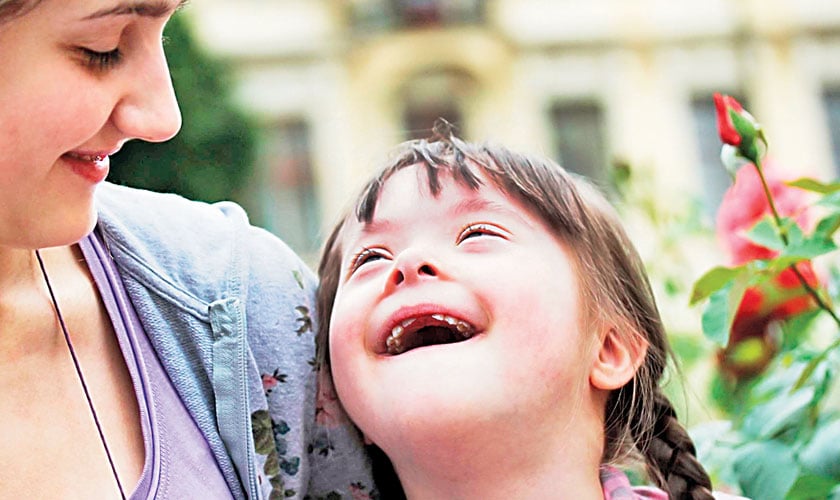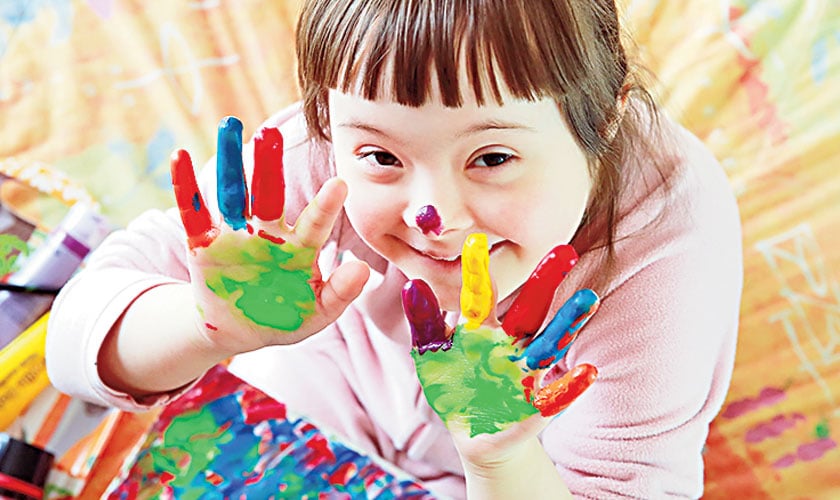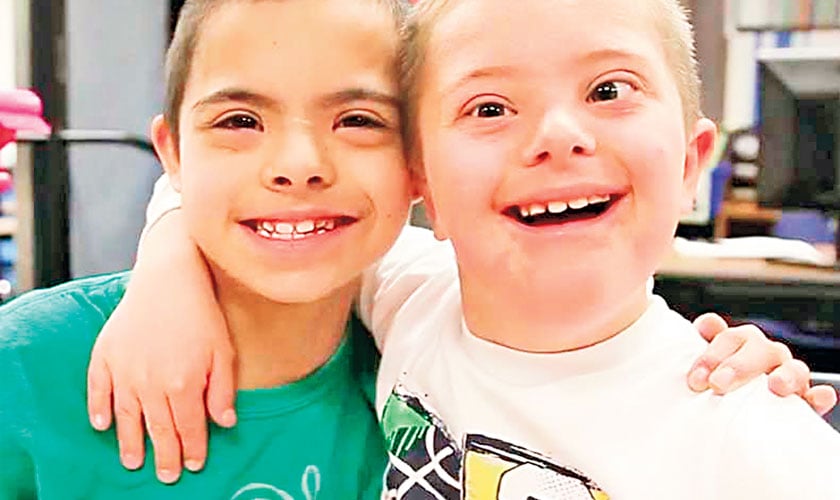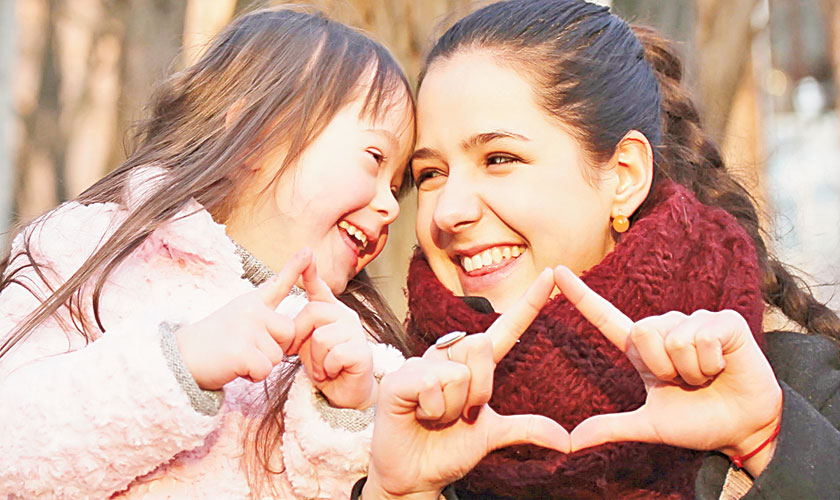Due to lack of awareness, disabled-children are looked down upon and given sympathetic looks in our society. In this regard You! talks to different specialists who guide mothers on how they can play an important role in making their child become a part of this big circle of life...
Due to lack of awareness, disabled-children are looked down upon and given sympathetic looks in our society. In this regard You! talks to different specialists who guide mothers on how they can play an important role in making their child become a part of this big circle of life...
The most precious feeling in the world is to hold your child for the first time. When a woman becomes a mother, she transforms into a completely different person - a fearless, brave and strong woman. Among these mothers are a few of the most courageous women who are facing the world with a smile on their face and extending unparalleled support to their children -mothers of children with special needs.

Unfortunately, in our society because of illiteracy and ignorance, disabled-children are looked down upon, ridiculed and given sympathetic looks. The society doesn’t let these children live in peace and with these children their mothers suffer the most. But, the criticism flares up their strength. They know they are ‘the chosen ones’. They have the skills and temperament needed to raise their children. They raise them with utmost care and attention and give them confidence to face the world. They stand behind them like a rock. Courage is often linked with the ability to brave looming physical dangers. But, these mothers have the power to face disapproval of friends and family.
However, sometimes, when night is dark and the neighbourhood is asleep. They sit by the window and look at the bright moon. They remember the ‘incident’ happened at a party last night -the autistic child crying loudly over a disagreement with other siblings. They remember sympathetic looks, glaring stares, the references of well known ‘babas’, and tips to handle ‘such children’. These women question their Lord, almost daily: why has He chosen a difficult life for their children? On the other hand, society doesn’t stop criticising them and give a downright judgment that it is their - mothers’ - fault that their children are not ‘normal’. Their wrong - read unreligious - actions may have invited the wrath of God. How insensitive and ridiculous it is to tell a mother that her child is suffering because of her sins!

Because of hurtful comments, a lot of parents tend to avoid family functions and other such occasions. No social life and constant worrying add stress to parents. It is a proven fact that parenting children with special needs can be stressful.
Anum Khan, a physical-fitness trainer by profession, is mother of a down-syndrome girl. She reminisces the initial stages of accepting the condition of her daughter. “I remember my husband saying that he would not let our daughter go out of his sight - not even get her married. I answered casually, ‘With her condition, she can’t get married’, that was probably the first time when I saw my husband breaking down. He didn’t conceal his emotions and cried for hours. Parents have a dream of watching their daughters in a red bridal dress. It is heartrending for parents to come to terms with such grave reality,” she shares.
Khan emphasises on the fact that parenting a special child is not easy. “We have our share of good and bad days. Sometimes it becomes too overwhelming. You see, as they grow older they require more care and attention. Such children are not self-sufficient and will require our help to get their daily chores done. Also, children observe their surroundings keenly. My daughter demands for getting an admission in her brothers’ schools. At times, it is hard to explain her why we can’t let her have what she wants,” she adds.

According to Khan, parenting of such children is too demanding which often affects the moods of other family members. Extra attention given to one child often results in other siblings being jealous or extra demanding. Juggling between work and home drains down the energy.
“On a surface level, it is just another day. But upon a closer look one will realise how hard it is to be a mother of a child with special needs. I constantly fear for the future of my daughter. Will she be able to cope with the world without me? I am uncertain to leave her with her cousins because I don’t want anyone to make her feel bad about herself. I want to keep her protected as much as I can. It is difficult - yes, but for your children everything is doable. If our daughter cannot have a happily-married life, there would be something greater in store for us,” states Khan.
Dr Shaista Ali, a public health specialist in the UAE, explains the general attitude towards disability. “In Pakistan, disability is a taboo. This is because of lack of understanding of the condition. There is a dire need to create an inclusive society for the young generation of our country - a society which let children be who they are.
“The whole idea of labelling children ‘disabled’ or ‘with special needs’ is terrible. This way society sends a constant reminder to such children that they don’t belong here. Nobody is perfect. Everybody has their own set of problems and ‘disabilities’. Depression, anxiety, anger, phobias etc are intertwined in the web of disabilities. For a person suffering from depression, going to work is a rollercoaster ride but this ‘disability’ is never discussed in the open. This is because we tend to ignore the covert disabilities. Physical disability is overt. Therefore, it is brought into the limelight often and children having any obvious disability are filtered through a completely different prism,” she elaborates.
“Consider this: You are travelling to an unknown territory - a place you have never been to, people you have never met or a language you have never spoken. At first it is hard, you think you cannot do anything over there and feel clueless. Gradually, you try to adjust in your surroundings. You get yourself familiar with the place, learn the new language, meet new people and understand their point of view. Now, you are more confident since you know everything about your surroundings. Once you get to know the place and language, the once difficult journey becomes beautiful. In the similar way, dealing with special children seems overwhelming because nobody has taught us what it is like to deal with such children. We don’t know how to react or what to say, which is completely normal. What is required is to coordinate with families and children to have a better understanding of the situation. This is where awareness comes in. Awareness is a stepping stone which leads to acceptability. Raising a special need child is a beautiful experience provided one keeps his/her expectations in control. Not every child is destined to become a doctor or engineer. But, everyone contributes towards the evolution of society and parents have to educate their child how they can be a part of this big circle of life.”
Dr. Ali believes that awareness is further divided into two categories: 1- understanding the condition in the ambit of medical terms and 2- responding to people or families with special needs. “The former is easy but the latter requires caution and care. We have firm, often misleading belief that having children with special needs is some form of the Divine punishment. Therefore, the innate response to people with special needs is of pity. This chain needs to be broken. People have to come out of this conservative thinking.”
Clinical Psychologist Ayesha Shaukat adds to the issue, “Awareness is the remedy. That is to say, awareness and stress are inversely proportional. As parents, you have to accept your child’s condition and tell yourself that it is not something ‘bad’. When you come to terms with the condition of your child and accept it, the stress level will naturally go down.”
According to Shaukat, the other step for such children should be making them a part of the general population. They should be enrolled in schools with other children so that they have an exposure to the general society.
While talking about lack of awareness in the society, Reshma Siddiqui, speech therapist at the Association of Retarded Children Danish Gah, Karachi, highlights the plight of parents. “I have come across a lot of cases where parents express that they have undergone proper medical treatment for their children but to no avail. This is the glaring problem of our society and the one which is needed to be dealt with. It is difficult for parents to accept their child’s condition but it is necessary. Such conditions are not something that can be treated by a dose of medicines. These children require proper training. We have to tailor an exclusive syllabus for them. We have to train them so that they can be independent in their daily chores.

“Special children with mental disability can be assessed as ‘borderline’, ‘mild’ and ‘severe’. Therefore, each child will require extra attention and care with respect to his/her condition. For example, autism is a vast topic in itself. One autistic child can be completely different from the other - his/her behaviour, comprehension, general understanding level, etc can be different from the other. Therefore, parents should follow programmes that cater to the needs of an individual child.”
In the context of the above-mentioned experts’ opinion, it can be concluded that it is the responsibility of the entire nation to contribute towards the welfare of children with disability. The presence of a fair, egalitarian society will make the standard of living of these children even better.